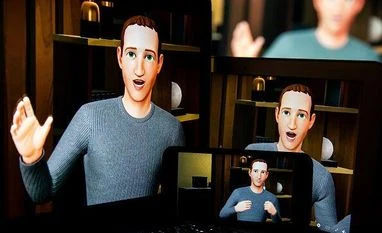By Parmy Olson
Within five days of Meta Platforms Inc.’s launch of Threads on July 5, the app had picked up 100 million users, eclipsing ChatGPT to become the fastest-growing app of all time. Not bad. Plenty of excited commentary has followed, asking if Twitter will be left in the dust. But there’s a good chance both services will become irrelevant over time, thanks to the erratic approach of its CEOs.
Early reviews of Threads aren’t looking good. The app has been called boring thanks to its heavy-handed content moderation, which bans the snark, trolling and political discourse that has fueled Twitter for years. Many of Threads’ 100 million signups aren’t posting much either. If this continues, Threads could be Meta founder Mark Zuckerberg’s latest flameout. One reason given by the New York Times is that the social media market is "fickle and faddish.”
Yet Meta’s real problem is that Zuck himself is fickle and faddish too.
Take his latest fitness craze. Zuckerberg has lately been posting photos of himself winning jiu-jitsu medals and posing with mixed martial arts stars, all sweat and six-packs. But a year ago the big hobby was hydrofoiling, and before that it was running hundreds of miles. There’s nothing wrong with switching one’s hobbies every so often, but Zuckerberg’s vision for Meta has followed the zigzagging of his amusements, pivoting in 2021 to virtual reality, and now in 2023 back to social media with Threads.
Zuckerberg’s itch to chase the next shiny object isn’t so dissimilar from Elon Musk’s. The blessing: Facebook itself began as a side project at Harvard, when instead of studying for his degree he tinkered late into the night on computer code that would become the world’s biggest social network.
The curse: engagement on Meta’s biggest money-spinner, Facebook, has slowly dwindled as Zuckerberg’s attention has switched between different endeavors like building a global cryptocurrency (a major effort that eventually died) or getting everyone to jump into the metaverse.
Also Read
In his personal life, Zuckerberg has chased mastery over a range of skills before picking up something else. He studied to become a fluent Mandarin speaker and then a hunter who only ate meat that he killed himself. Then he became a skilled hydrofoiler, and now he practices mixed martial arts, tussling in the gym with some of the world’s top fighters. In the past, he’s framed these hobbies as annual goals, one of which included a choreographed tour of people’s homes in every US state — an effort that looked a bit like the start of some sort of presidential run.
In 2019, he took a more sensible approach to his annual goal: fixing Facebook’s platform abuse problems. But then in 2020, he gave up. The annual goals stopped, and Zuckerberg said it was “time to do something different.” The coronavirus hit, and he retreated to his Hawaii compound. By the start of 2022, he was dealing with a terrible reputational blow from a whistleblower’s damning allegations about widespread social harms, along with a privacy tweak on iPhones that would cost Facebook billions of dollars in lost revenue and a looming antitrust lawsuit that threatened to break up his company.
Cue another side project, the biggest one yet: building a virtual reality platform. Zuckerberg dug in enthusiastically, posting videos of himself wearing high-spec headsets or trying haptic gloves and neural interfaces — the stuff of science fiction. He changed the company’s name, giving it the futuristic new direction of the metaverse, a virtual world where can people interact with one another as 3-D avatars.
When podcaster Joe Rogan asked Zuckerberg why he chose to get into the metaverse, he didn’t answer. Then he went on to say that waking up every morning as Facebook’s CEO was like getting “punched in the stomach.”
As the new diversion has begun to look more like an escape, Zuckerberg’s fervor has fallen on deaf ears. Many consumers still don’t want to buy Meta's expensive headsets and neither do businesses. The tech press has panned his efforts. The metaverse has cost more than $10 billion and shows little sign of picking up followers. Zuckerberg’s best bet is that Apple Inc. will help energize the space and spark greater interest in using VR with its VisionPro headset. In the meantime, there’s Threads, where Zuck has been posting up a storm. On Instagram, the photos of him wearing headsets are gone, while screenshots of Threads and mixed martial arts are up.
Are there more pressing issues that Zuckerberg needs to maintain focus? Sure. But thanks to his control of the company’s voting rights, no one, not even Meta’s board, can knock him off his perch as chief executive officer and chairman, or do much about his unpredictable steering of the ship.
History may look back on Zuckerberg’s grand deviations as being symptomatic of a generation of tech tycoons who, like Musk, are frequently pulled off course by the lure of new innovations and quixotic visions. Zuck would do well to go back to his 2019 goal of making Facebook a safer, more enticing place to socialize and do business, rather than start big new projects like Threads. Facebook has been his golden goose after all. Instead, he seems on course to personify how fickle tendencies can bring unprecedented wealth with one terrific idea — and plenty of flops the rest of the time.
To contact the author of this story:
Parmy Olson at polson29@bloomberg.net
© 2023 Bloomberg L.P.
)